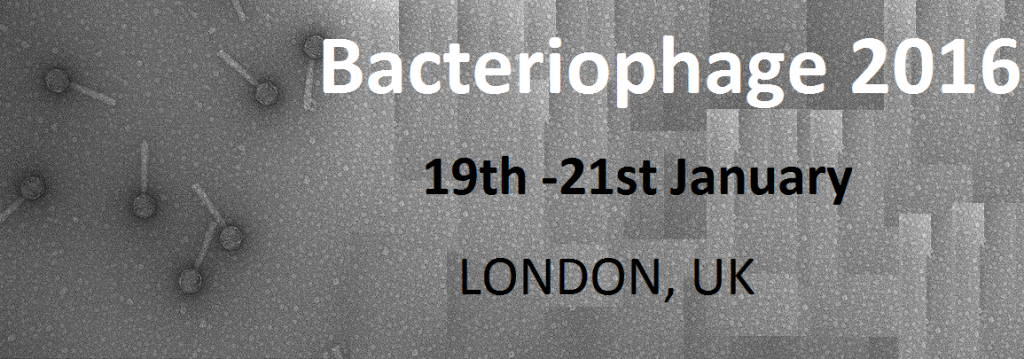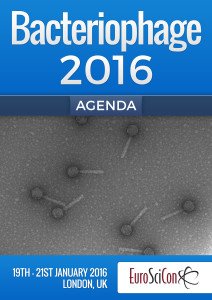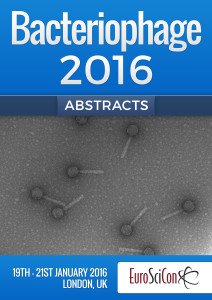
Following on from last years successful event this event will discuss the roles of bacteriophages, ranging from fundamental biological research to their use in medical and industrial biotechnologies.
CLICK HERE TO REGISTER
A late registration fee applies after Nov 20th 2015
This event has an open abstract session.
The Deadline for abstract submissions for oral presentation is October 10th 2015
Abstracts for poster presentation only can be submitted up to two weeks before the event
You can download the instructions for authors at www.euroscicon.com/ABSTRACTSUBMISSIONS.pdf
This event has CPD accreditation
Talks Include
-
TBC:
Prof Elena Orlova, Department of Biological Sciences ISMB, Birkbeck College, London, UK
-
Bacteriophages and their endolysins for the biocontrol of Staphylococcus aureus and Clostridium difficile:
Dr Aidan Coffey, Cork Institute of Technology, Bishopstown Cork, Ireland
-
Phage Fishing: Novel approaches for isolating bacteriophages:
Dr Damian Magill, School of Biological Sciences, The Queen’s University of Belfast, Medical Biology Centre, Northern Ireland
-
Activation of cellular cold shock response and abortive infection mechanism by phage encoded protein:
Dr Elena Bidnenko, INRA MICALIS, Jouy en Josas, France
-
Interaction of lysis protein E from bacteriophage phiX174 with translocase MraY on the bacterial peptidoglycan biosynthetic pathway:
Professor Timothy DH Bugg, Department of Chemistry, University of Warwick, UK
-
The enemy insight: tectiviruses preying on the Bacillus cereus group:
Dr Annika Gillis, Université Catholique de Louvain, Laboratory of Food and Environmental Microbiology, Belgium
-
Bacteriophages and antibiotic resistance genes in the environment:
Dr. Maite Muniesa, Department of Microbiology, Faculty of Biology, University of Barcelona, Spain
-
The Ecoli phage shock protein (psp) response-what does it sense and do?:
Professor Martin Buck, Dept Life Sciences, Imperial College London, UK
-
Talk to be confirmed:
Professor George Salmond, Department of Biochemistry, University of Cambridge, UK
-
Filamentous phage - applications from nano to metagenomic scale:
Dr Jasna Rakonjac, Institute of Fundamental Sciences, Massey University, Palmerston North, New Zealand
-
How filamentous bacteriophage is used as a tool to allow the generation of recombinant antibodies against single cells in a heterogenous population:
Dr Peter Kristensen, Aarhus University, Department of Engineering, Denmark
-
Research activities at the DSMZ - more than a collection:
Dr Johannes Wittmann, Leibniz-Institut DSMZ - Deutsche Sammlung von Mikroorganismen and Zellkulturen GmbH, Germany
-
Campylobacter phages: Biocontrol and resistance development:
Dr Lone Brøndsted, Associate professor and Deputy Head of Department, Department of Veterinary Disease Biology, University of Copenhagen, Denmark
-
Phage-host interactions of dairy lactococcal phages:
Dr Jennifer Mahony, School of Microbiology, University College Cork, Ireland
-
Insights into protein-primed genome replication of temperate phage Bam35:
Dr Modesto Redrejo Rodríguez, Centro de Biología Molecular “Severo Ochoa” (CSIC-UAM), Spain
-
Prophage control of bacterial behaviour: Shiga toxin-encoding lysogenic bacteriophages and their impact on E. coli super-shedding from cattle:
Professor David Gally, The Roslin Institute, University of Edinburgh, USA
-
Molecular mechanism of action of the bacteriolytic E protein from bacteriophage phiX174:
Professor Tim Bugg, Department of Chemistry, University of Warwick, UK
-
Location of the unique integration site on an Escherichia coli chromosome by bacteriophage lambda DNA in vivo:
Dr Rinat Arbel Goren, Department of Physics of Complex Systems, Weizmann Institute of Science, Israel
-
TBC:
Mr Mark Engel, Phagelux, Inc, Shanghai, China
-
Selective pressure imposed on Pseudomonas aeruginosa by virulent bacteriophages: the importance of pseudolysogeny:
Libera Latino, Université Paris-Sud, Orsay cedex, France
-
Phage-like chromosomal islands alter global transcription patterns in Streptococci:
Dr. Michael McShan, University of Oklahoma HSC, College of Pharmacy CPB307, Oklahoma City, United States
-
Endolysin-based antimicrobials for control of bacterial pathogens:
Dr Mathias Schmelcher, Institute of Food, Nutrition and Health ETH Zurich, Zurich, Switzerland
-
Engineering Thermal Stability to Phage-encoded Bacteriolytic Enzymes:
Associate Professor Daniel C. Nelson, Ph.D., Institute for Bioscience and Biotechnology Research and Department of Veterinary Medicine, University of Maryland, Rockville, MD, United State
-
Bacteriphages infecting the fish pathogen Flavobacterium columnare in aquaculture:
Dr Lotta-Riina Sundberg, Centre of Excellence in Biological Interactions, Department of Biological and Environmental Science and Nanoscience Center, University of Jyvaskyla, Finland
-
TBC:
Dr Yves Briers, Department Applied Biosciences, Ghent University – Campus Schoonmeersen, Gent, Belgium
-
Phages limited dependence on host non-essential functions: the bacteriophage SPP1 case
Dr Paulo Tavares, I2BC, Department of Virology, Campus CNRS de Gif-sur-Yvette, Gif-sur-Yvette, France
-
Pseudomonas aeruginosa Mu-like bacteriophages: genomic diversity and mechanism of replicative transposition.
Mrs Christine Pourcel, Université Paris-Sud, Orsay cedex, France
- Biology and genetics of telomere phages.
Dr Stefan Hertwig, Diagnostik, Genetik und Erregercharakterisierung, Federal Institute for Risk Assessment, Bundesinstitut für Risikobewertung Berlin, Germany
#Phage2016 Tweets
Contact
Phone: (+44) 020 7183 82 31
Registration Fee
Registration includes entry to all the event, lunch and all refreshments, networking opportunities and access to exhibitions.
|
REGISTRATION FEE |
LATE REGISTRATION FEE |
|
Standard |
£445 + VAT |
£545 + VAT |
|
Academic |
£295 + VAT |
£395 + VAT |
|
Student |
£195 + VAT |
£295 + VAT |
If you do not want to attend the full three days you can also book single days at the following price
|
REGISTRATION FEE |
LATE REGISTRATION FEE |
Standard |
£195 + VAT |
£275 + VAT |
Academic |
£125 + VAT |
£195 + VAT |
Student |
£95 + VAT |
£145 + VAT |
Discounted Group Bookings
If 3 or more people register together, then you will receive a discount of £20.00 off for each person in the group
These discounts are applied automatically on registration
Bursary applications
Euroscicon will consider all applications for bursaries to cover registration, food and refreshments on the day of an event. We cannot, at this time award money for travel or accommodation. To download an application form see www.euroscicon.com/Bursary.docx
Venue, Accommodation and Travel Details
This event will be held at Cineworld: The O2 Peninsula Square London SE10 0DX United Kingdom
Once inside the O2 building please make your way to Cineworld. A map of the O2 can be found by clicking here
To download the accommodation and travel details please click here
Payment Instructions
Payment must be received prior to the meeting
Credit card
You can pay during your online registration using your credit card. The information taken will be by secure server. Using this mode of payment you can guarantee that your fee has reached us prior to the conference and you will be listed as registered
Paypal
You can either use your Paypal account or click on the no account link to pay directly by credit or debit card
If you wish to pay by cheque,purchase order or bank transfer, please contact sales [@] euroscicon.com
Abstract and Poster Presentations
All abstracts accepted for oral presentation are also automatically accepted for poster presentation
INSTRUCTIONS
- How to submit your abstract -www.euroscicon.com/ABSTRACTSUBMISSIONS.pdf
- Accepted poster instructions - www.lifescienceevents.com/poster-sessions
- Accepted oral presentation instructions - www.lifescienceevents.com/oral-presentations

